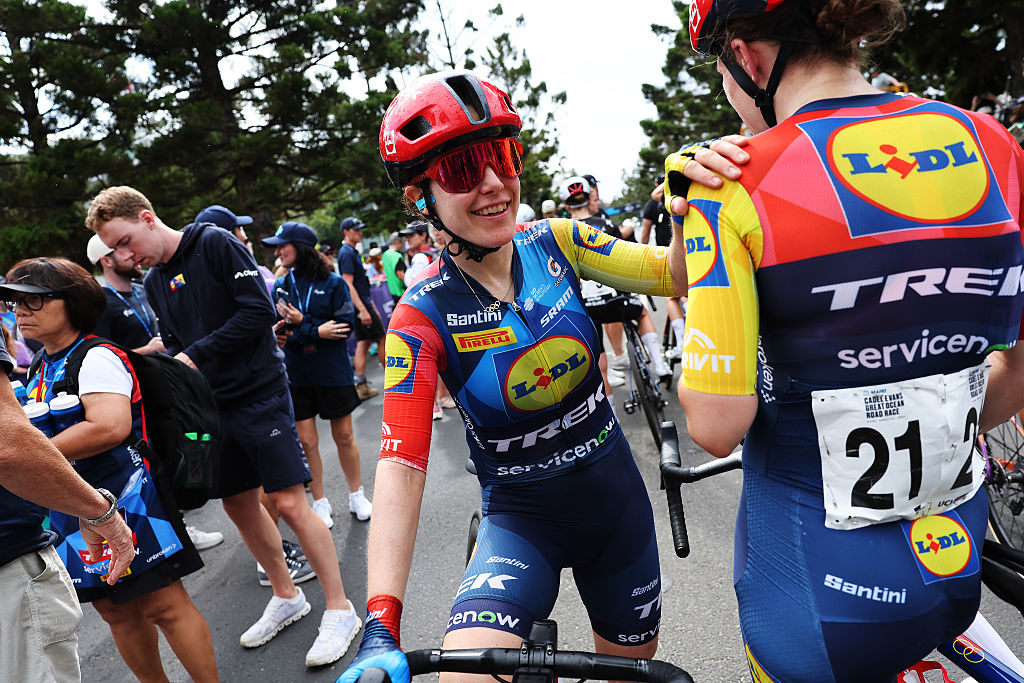When is it too cold to race cyclo-cross?
Freezing conditions spark debate about safety
The latest race content, interviews, features, reviews and expert buying guides, direct to your inbox!
You are now subscribed
Your newsletter sign-up was successful
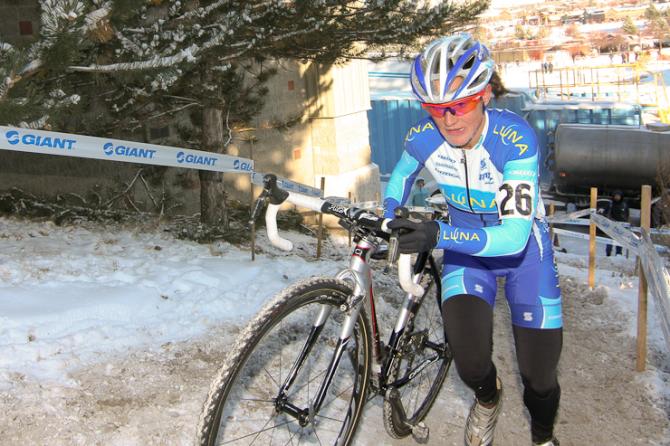
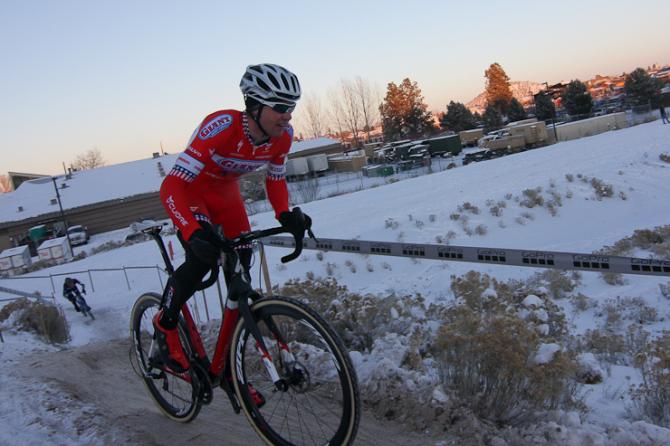
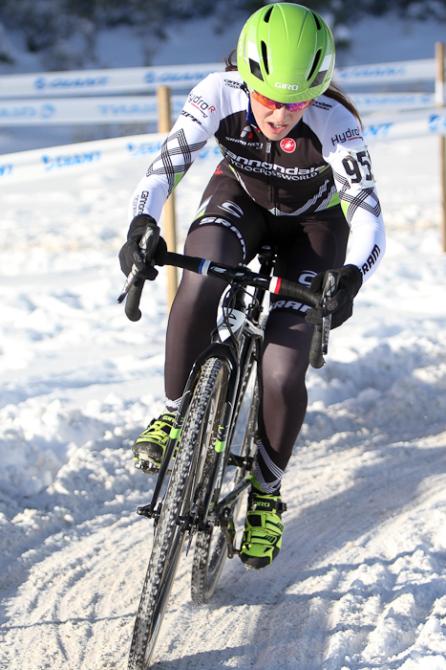
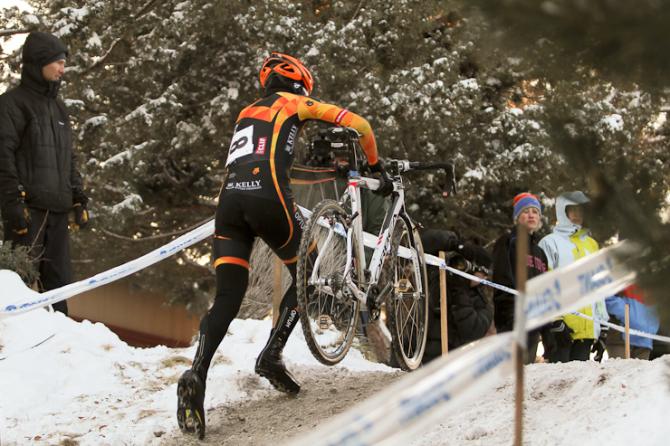
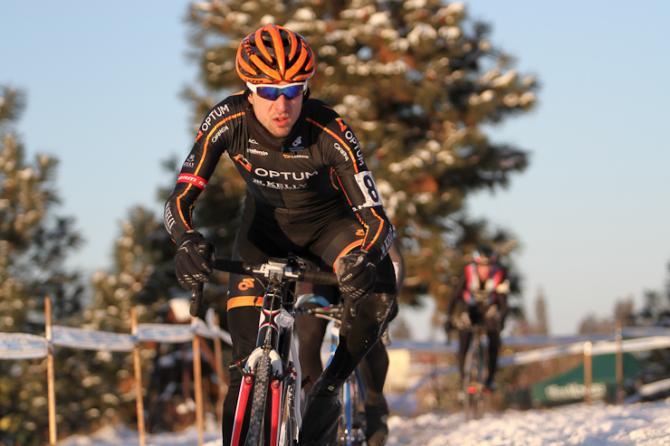
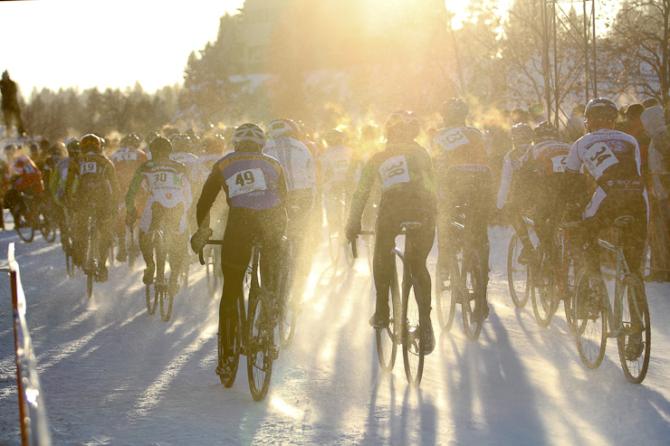
Cyclo-cross is a discipline that prides itself on its willingness to stare down at bad weather with abandon; be it torrential rain, hurricane-force winds, heaps of snow, treacherous ice or bitterly cold temperatures. In the hard world of cyclo-cross, the worse the conditions, the more epic the racing will be. But can that ethos go too far?
The answer varies, depending on who you ask. The Deschutes Brewery Cup in Bend, Oregon, on December 7 tested the boundaries of reasonableness when a cold front blew into Central Oregon days before the race, dumping nearly a foot of snow and dropping temperatures to history making sub-zero lows. By the time the elite riders lined up on the course Saturday afternoon for the final UCI C1 race on USA Cycling's Pro CX Calendar, the temperature was hovering just above zero.
After just 100 minutes of racing in the freezing weather – 40 minutes for the women and 60 for the men – several riders had suffered frostbite, and wheels were set in motion for a prominent component maker to voluntarily recall one of the sport's latest innovations.
It's cold outside
Chapter 1, section .058 of the UCI Cyclo-cross rulebook states that the president of the commissaries panel, after consulting with the UCI technical delegate and the organizer, may [emphasis added] cancel the event in case of “difficult weather conditions” such as strong winds, heavy snowfall or temperatures below 5 Fahrenheit (-15 C).
The weather in Bend that morning certainly fell within that range. Thermometers dipped to negative double digits overnight and were well below zero when the first categories hit the course at 8 a.m. Although the mercury rose throughout the day into single-digits, the steady wind blowing in off the nearby Deschutes River cut to the bone, causing eyes to tear up and turning liquids into ice on contact.
Three-time national champion Tim Johnson (Cannondale-Cyclocrossworld) bested the elite men's field in just over an hour of racing around the brewery grounds, while Katerina Nash (Luna Pro Team) cruised to the women's win in just under 40 minutes. The women started in bright sunlight around 2:15. The men's scheduled 60-minute race started in waning sun about 3:35. Sunset that day was at 4:26, and the temperatures dropped accordingly.
The latest race content, interviews, features, reviews and expert buying guides, direct to your inbox!
“I guarantee you it will go down in the annals of history as one of the most epic cold weekends ever,” said longtime Oregon cyclo-cross promoter Brad Ross, who runs Oregon's Cross Crusade series and has organized multiple national championship and USGP events.
Despite the historically cold temps, Ross said, none of the competitors approached him about canceling the race that weekend. Nevertheless, Ross and Canadian UCI Chief Commissaire Jim Bratrud did discuss the weather and the possibility that the show might not be able to go on.
“We had conversations about it that weekend, for sure, because it was hovering down around zero degrees and the UCI has a rule that says if it's below 5 degrees you need to start to have the conversation at least,” Ross said, adding that Bratrud ultimately left the decision completely up to him.
“The reason we continued on with it was because the people who were there – obviously we had a lot of no-shows – but the people who did come wanted to race,” Ross said. “The people who actually came down there that day to the venue to register and pin their number on, they were still wanting to race their bikes.”
Failing brakes and frozen fingers
The course that weekend in Bend was fast and flowing, with multiple run-ups and tricky off-camber descents. But after several riders' SRAM hydraulic disc brakes suddenly lost power, it was quickly clear that the components weren't up to the challenge of performing in sub-zero weather. Riders swapped bikes only to find that brakes on both of their race machines could suddenly fail in the weather.
Following the race, multiple teams, riders and mechanics contacted SRAM about the problem. The company studied the issue, and on December 13 announced a voluntary recall for all Red 22 and S-700 hydraulic disc and rim brakes, going so far as to ask people with bikes equipped with the products to stop riding them immediately. Although SRAM now says the seal in question could also fail under normal temperatures, the sub-freezing weather in Bend exacerbated the problem.
Jeremy Durrin's brakes were working fine that day. But his own problems started when his bike slid out and he planted both hands into the powdery snow to brace his fall. Durrin is currently traveling in Europe with his wife, fellow cyclo-cross racer Gabby Day, but he detailed the events in Bend via Twitter.
Durrin wrote that he thought he was well prepared for the race and the weather, using both chemical hand warmers and a combination of gloves that had worked well in the past. But in hindsight, his hand protection was clearly inadequate. “I still can't feel my left hand's fingers,” he Tweeted not long after the race. “This is not good. That was awful. Never want to do that again. Would rather be punched in the face.”
Durrin left Bend Sunday morning to travel back east to his home in Massachusetts, and as he did, blisters began to form on his fingertips, which still had no feeling. Durrin had his fingers checked by a doctor at an emergency clinic in Chicago's O'Hare airport and was diagnosed with stage 2 frostbite. The Chicago doctor treated Durrin's frostbite and prescribed antibiotics to fight the infection. Durrin finished his trip home and then flew to Spain the next day.
About half a dozen competitors in the elite men's race eventually reported cases of nerve damage or frostbite on their fingers and toes, and one unfortunate rider reportedly suffered frostbite on his penis.
While Durrin and other riders were seeking treatment or traveling home that Sunday, many of their fellow competitors suited up again to race the final event of the 2013 Cross Crusade on the same course as the day before. The previous day's winners, Johnson and Nash, were among the pros who toed the line. The wind had died down, and temperatures, while dropping to -24 overnight, climbed into double digits by the start of the elite race that afternoon. Organizers had delayed the day's start and shortened most races to make up the difference. The longest race was reduced to 45 minutes.
Bend wasn't the only place in the US hosting a race in near-zero temperatures that weekend. Weather in Boulder, Colorado, was similar to Bend's for a local race at the Boulder Reservoir. The USA Cycling Cyclo-Cross National Championships are scheduled to take place January 8-12 at Valmont Park in Boulder, where temperatures are currently in the upper 60s.
The intersection of racing and near-zero temperatures is rare, but it's definitely a possibility in many parts of the US this time of year. Nationals in Madison, Wisconsin, last January saw sub-zero weather for the start of racing on Thursday and Friday before temperatures warmed into the upper teens for the Elites. Temperatures that same weekend in Boulder were near zero.
Where do you draw the line?
Although the UCI rule says the officials may cancel a race when temperatures dip below 5 degrees, some riders believe the rule should be more concrete, if for no other reason than to protect the competitors from themselves.
“That's the coldest I've ever raced in,” said two-time national champion Ryan Trebon, Tim Johnson's Cannondale-Cyclocrossworld teammate. Trebon, a Bend resident, was training in Ventura, California, when he spoke with Cyclingnews this week. He said he still did not have feeling in the tips of two fingers following the Deschutes Cup.
“I've done races where it was like 20 degrees before, but not zero degrees,” said Trebon, who finished fifth that day. “I feel that's a little bit too cold to be outside. I wouldn't have minded not racing. And I know I'm not the only one who would say that.”
Trebon definitely wasn't the only rider questioning the decision to race in Bend. Jeremy Powers, the 2012 national champion and Rapha-Focus rider who finished fourth at the Deschutes Cup, said racing in the Bend conditions was dangerous.
“Do I think that a good rider won? Absolutely,” Powers said. “Tim rode a good race. I'm not trying to take anything away from Tim Johnson's ride there. That would be completely wrong. But I do think it was too dangerous for the group as a whole to be out there racing. And I definitely think we need to examine at what point we call it."
“Just the guys who I know like Ryan, Yannick [Eckmann], Jeremy Durrin, Barry Wicks, there were other riders who have lost feeling in their fingers or got frostbite – another guy got frostbite literally on his penis – when we're talking about stories like that, it's gone too far,” Powers said.
Danny Summerhill, a 24-year-old from Colorado who finished ninth that day in Bend, said the experience justifies a mandatory cut-off temperature for cancellation.
“I say that mostly because of the injuries I've heard of from so many people,” he said. “Between all of the toes going black and hospital visits and fingers that are still numb, I think enforcing a rule like that would be a wise and safe call.”
All three of the riders questioning the Bend conditions suggested the impetus to cancel the race must come from the officials on site, rather than asking the promoters or riders to police themselves. Even Ross said he had hoped the UCI chief commissaire would make the call that day in Bend, rather than placing all the pressure on the promoter.
“He was like, 'It's your event, you know what's at stake here as far as the money and the sponsors and the TV and all that stuff,'” Ross said. “He left it completely up to me what to do in regards to whether to hold the event or cancel it or postpone or anything like that. It was great that he did that. But at the same time, I was sort of looking to him to have him make the decision.”
While promoters, no matter how well meaning, may have conflicting financial reasons to go forward, riders also make the decision to race under a mix of pressure from peers, the public and their own career ambitions, Powers said.
“Ryan said it to me the other day, that it's almost as though we have to be protected from ourselves,” Powers said. “And I think that's a really good thing to say. We tend to downplay the social implications of standing up and saying, 'Hey guys, I don't feel comfortable doing this race.'"
“I guarantee that some of the people you've spoken to really do feel the social pressure to not say anything about this because they're nervous of what the general public will think,” Powers continued. “Well I'm not. I'm dead serious when I say that I think it was way too cold and it was way too dangerous."
“Do we need to have someone lose a finger or two?” Powers asked. “Would that be everyone's fault? Would it be just that person's fault? I don't know. I look at it and I think as a group we should be smarter than that. We should set ourselves up and have rules in place and not have that happen in any circumstance.”
Powers insisted the onus was on the UCI to create and enforce a better rule regulating racing in extremely cold weather, and he suggested a system where any race below 15-20 degrees would be postponed to another date if possible. Because all of the weather-induced injuries in Bend appeared to take place in the hour-long elite race near the end of the day, Trebon suggested a system that would shorten races in conjunction with falling temperatures.
You take what comes
Despite those suggestions, at least one veteran rider believes the current system works just fine. Tim Johnson, the elite national champion in 2000, 2007 and 2009, disagrees with his cohorts' ideas about racing in cold weather. Johnson said he doesn't believe the race in Bend should have been shortened or canceled, and he asserted that the UCI's weather rule is “fine as it is.”
“I don't think any of the other 800 people who were there that day needed it to be canceled either,” Johnson told Cyclingnews this week by cell phone after pulling his car off a rural Vermont highway to talk. “If you want to race in conditions that are nice all of the time, then race during the spring and the summer. If you want to race 'cross, it's a fall and winter sport, and you take what comes.”
Johnson, whose gloves in Bend were made by the same well-known sponsor as Durrin's, is a member of USA Cycling's cyclo-cross commission, and he said members of the group discussed the issue recently in an email thread.
“As part of the discussion that we had, it was pretty resounding that there's no such thing as conditions that are too poor,” he said. “There have been studies about exercise in cold weather, and it's really not a big deal if you're ready for it. That same weekend as Bend there were a couple of races in Colorado where the riders dealt with single-digit temperatures – pretty sunny, no wind – and it was fine. And really, in Bend we had a pretty similar situation. There was almost no wind at all.”
The discomfort in Bend on December 7 was not even the coldest he's ever felt in a race, Johnson said, noting several chilled road races that covered more than 100 miles over four or five hours, compared with the one-hour of exposure in an elite men's 'cross race. And he said the 2000 national championships in Kansas City, where Johnson won his second national title, took place in similar temperatures but with much stronger winds.
“That was very, very cold, and it seemed even colder than it was just because of that biting wind,” he said. “Everyone made it through that OK.”
Johnson used the hypothetical example of officials evacuating racers, fans and staff in the case of an incoming tornado as the type of emergency weather event that would merit cancellation. But based on his belief that it's possible to prepare properly for almost any kind of weather, nothing in Bend called for such an extreme measure.
“When you read articles about safe temperatures for exercise – like every year Runner's World will run an article on how to run in the winter – it really just all comes down to being prepared and learning how to deal with regulating your temperature,” Johnson said, adding that a key to performing well is limiting sweat that can cool you down too much.
“There's no reason with the 8 million pairs of gloves on the market, and undershirts and hats, and all kinds of stuff … [Johnson paused and did not finish the sentence]. I don't know. Go read Shackleton,” he continued, referring to the turn-of-the-century polar explorer whose crew was stranded on the Southern Ocean for two years when an icepack trapped their ship and eventually destroyed it.
“Go read a book about somebody who did something that's actually hard, then you'll realize that doing a bike race for eight laps of a 2km course is … [Johnson paused again]. I mean if you can't do that when it's cold outside, well … [Johnson paused again and this time began to chuckle]. Are you locked on an ice sledge somewhere? I mean, come on, get over it. Having to plan for being out in the open for one hour, I don't think it's that hard anymore.”
But Powers, who agreed with Johnson that extreme temperatures affect everyone differently, insisted there needs to be a serious discussion among the sports' governing bodies about extreme conditions.
“I think maybe calling the race around 5 degrees is just not adequate, because we went past that,” Powers said. “We did that and it didn't work out real well. I do expect that they'll address it, and I look forward to the solution.”
Growing up in Missoula, Montana, Pat competed in his first bike race in 1985 at Flathead Lake. He studied English and journalism at the University of Oregon and has covered North American cycling extensively since 2009, as well as racing and teams in Europe and South America. Pat currently lives in the US outside of Portland, Oregon, with his imaginary dog Rusty.
